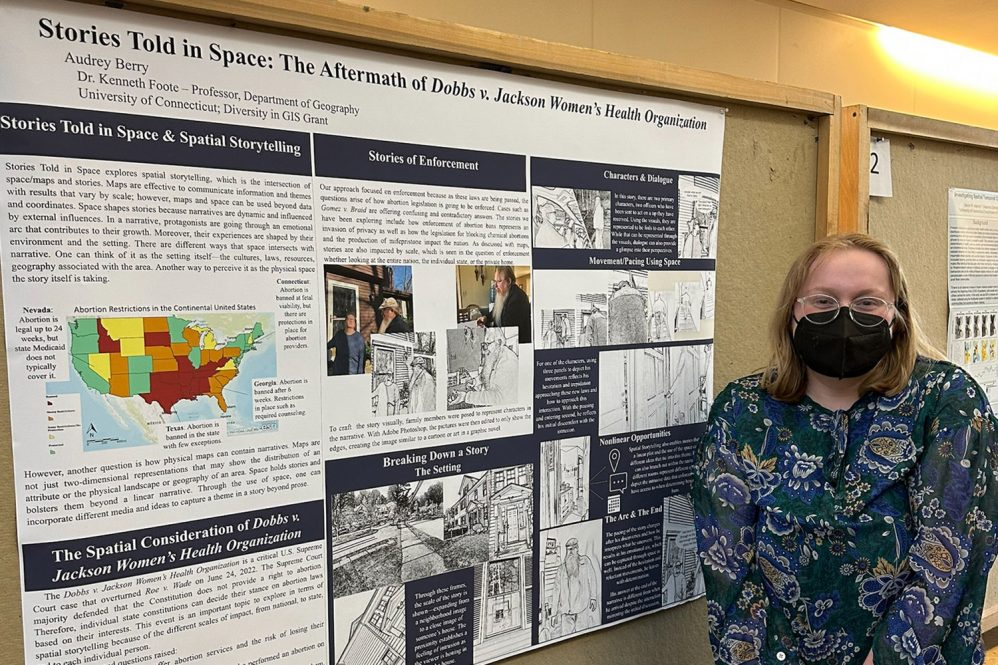By her junior year, Kelly Ruesta ’24 (CLAS) had discovered what she wanted to study, found a sense of belonging in campus cultural centers, and used her voice to advocate for underrepresented students.
But somehow, it didn’t feel like enough.
“There was an expectation that I should already have done research,” explains Ruesta, who is pursuing an individualized major in health disparities among marginalized groups. “Especially [because I was] hearing my peers talk about their own experiences and labs.”
She says the number of resources available was frankly “overwhelming,” and as a first-generation student, she didn’t know where to begin.
“I was not familiar with the process of asking or advocating for myself in order to be in spaces where research opportunities were provided,” Ruesta says.
But with the help of one of several programs that connect CLAS students from marginalized backgrounds with mentors who can prepare them for life after UConn, that quickly changed.
Ruesta was selected to participate in the pilot Research MASTER (Mentoring and Scholarship Training for Emerging Researchers) program in the Department of Anthropology. The new initiative, created by the department’s Equity and Inclusion Committee with support from a CLAS DEI Initiative grant, provides guided access to research experiences for undergraduates from underrepresented groups.
By being paired with graduate students, undergraduates are given an opportunity to work as apprentices on doctoral projects, which fosters deeper engagement with research while elevating transferable skills in critical thinking, communication, problem solving, and time management. Ruesta, who is from Peru, says she’s had many mentors in her life — both in her culture and academics — but this was the first one that focused on her future career.
“Joining this program, I have had the support of a graduate student throughout the research process,” she says. “She has taken the initiative and space to support me in my current interests and challenge me to think beyond college.”
I have had the support of a graduate student throughout the research process.
“Many students don’t know that they can ask, don’t feel comfortable asking, or don’t feel like they’re at a point where they know what questions to ask if they’re potentially interested in pursuing graduate studies,” says Eiling Yee, associate professor of psychological sciences.
Yee leads the Mentoring Aspiring Graduate students and Building an Inclusive Community (MAGIC) program, which aims to help first-generation students get into and succeed in graduate school. MAGIC features a network of more than 90 faculty and graduate student mentors in the fields of psychology, cognitive science, neuroscience, linguistics, and speech, language, and hearing sciences. Mentors provide mentees with advice on topics such as choosing a program, CVs, personal statements, and funding graduate school.
“[We’re] getting students to think about it early on,” says Crystal Mills, coordinator for the Institute for the Brain and Cognitive Sciences (IBACS), who helps facilitate the program. “I think a lot of them can miss out on opportunities to join labs and get that experience earlier.”
Yee says there’s also an added benefit: exposing faculty more personally to students from different backgrounds. In the last cycle, 45 percent of the mentees identified as first-generation, 75 percent as nonwhite, and 22 percent as having a disability.
“Some faculty might not understand that it’s a really big deal to apply to graduate school — 75 dollars times four is a burden,” she explains, referring to graduate school application fees. “So, they’re hearing and getting that firsthand knowledge from the students.”
Faculty in the Department of Geography are also opening doors for underrepresented students interested in STEM fields, specifically geographic information science (GIS).
Audrey Berry ’24 (CLAS) was one of the first recipients of a College-funded diversity grant in the department, where students receive training and research experience from a faculty member. Berry, who is majoring in history and urban and community studies and minoring in GIS, has spent the semester working with Geography Professor Ken Foote on a project about spatial storytelling.
“[Professor Foote] mentioned that professors with varied backgrounds at other universities were included, which made me interested because everybody would have a different approach to how space and stories intersect,” says Berry. “It was a great opportunity because I was able to also see their work.”
She hopes that other CLAS students will take advantage of the opportunities at their fingertips.
“I think that applying for a grant is an effective way to put yourself out there and be supported doing it,” she explains.
“It affords you the opportunity to explore and learn.”



